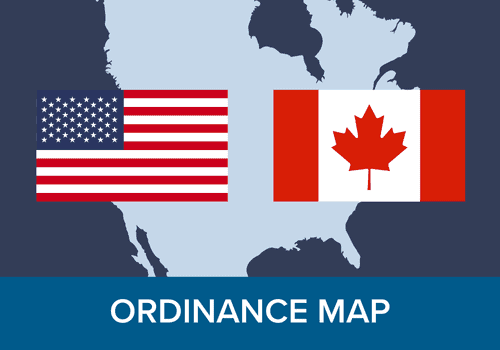Responsible Light at Night for Local Governments
Darkness is essential to all living things on Earth. People, plants, and animals all depend upon the natural rhythms of the day/night cycle to thrive. If not responsibly designed, outdoor light at night uses more energy than necessary, increases light pollution, creates discomfort for people, and negatively impacts wildlife and ecosystems. As lighting decision makers, it is critical that we create policies and make lighting choices that balance the importance of darkness with our society’s need for quality illumination. Select a topic below to learn more.
Outdoor Lighting 101
Outdoor LED lighting offers many benefits over older lighting types, including improved energy efficiency, better optical control, and more dimming capabilities. When thoughtfully applied, these benefits can help avoid the unintended consequences of light pollution. However, the increased amount of violet and blue wavelengths from some of these LEDs has been linked to potentially harmful effects on humans, plants, insects, and animals. Because of this, using only the right amount of light in the right location is critically important to ensure comfort and safety. The DLC’s “Seven Strategies to Minimize Negative Impacts of Outdoor Light at Night” resource below provides more detailed guidance on the most important things you should consider when undertaking a responsible outdoor lighting project.
Why Darkness Matters
The use of artificial light at night has far-ranging impacts for humans, plants, and animals alike. Most living things rely upon a balanced ecosystem and the day/night cycle to thrive. At the same time, our 24/7 society needs light at night, especially for illuminating transportation pathways and creating safe environments. It’s critical that building owners, city officials and other lighting decision makers recognize the importance of darkness and ensure our societal need for light is balanced with protection of the dark.
If not responsibly designed, outdoor light at night uses more energy than necessary, increases sky glow, impedes upon adjacent properties, and negatively impacts wildlife and environmental ecosystems.
Learn more about artificial light’s impact on wildlife and ecosystems in the webinar below, featuring experts from Cornell University’s BirdCast and the National Park Service’s Night Skies Program.
What is LUNA?
The DLC is a non-profit organization that improves energy efficiency, lighting quality, and the human experience in the built environment by creating minimum thresholds for lighting efficacy, quality, controllability, and reliability. DLC LUNA is a set of additional performance criteria and a list of qualified products that represent the highest quality outdoor lighting – lighting that minimizes light pollution, provides appropriate visibility for people, and limits negative impacts to the environment. In addition to these advantages, using LUNA products also help communities save energy because listed products also meet the DLC’s rigorous requirements for all LED lighting.
Requiring LUNA qualified products for outdoor lighting in dark sky policies, ordinances, or bylaws helps you be confident that your lighting projects save energy AND can be used to follow best environmental practices for nighttime lighting.

Save Energy
There is clear opportunity for energy savings when light is used only where and when it is needed. Any light directed up into the atmosphere, or left at full brightness when a space is unoccupied equals wasted energy. (Think about all the light you see from an airplane at night!) According to the International Dark-Sky Association, approximately $3 billion worth of energy is lost to sky glow each year. Installing LUNA qualified outdoor lighting is a first step to significantly reduce that number because LUNA products are required to limit uplight.
The key difference between DLC LUNA and other dark sky qualification programs is that LUNA requires fixtures to meet a baseline efficacy threshold of 105 lumens/watt and have dimming capability so that they can be used with controls. This ensures that qualified products are both energy efficient and minimize light pollution, each being critical metrics for local governments looking to meet their energy efficiency and carbon reduction targets. Every kilowatt-hour that is saved avoids 1.6 pounds of CO2 emissions! This can be substantial for outdoor LED retrofits and new construction projects.
Create an Ordinance
Outdoor lighting ordinances, bylaws, and other community policies can help mitigate light pollution and negative impacts on wildlife, address light and energy equity issues, and provide guidance to help select products that meet the community’s needs. Written policies that specify what type of light is acceptable during nighttime hours clarifies expectations for product selection and verification. Read more about lighting ordinances here.
The DLC has created sample language that can be used by communities as a starting point in creating their own light pollution bylaws or ordinances, and modified to meet the specific needs of the community or municipality. View and print the document here.
We are also is in the process of creating additional resources to help local governments develop and implement a successful dark sky policy or ordinance. You can start by watching the video below.
Start here for an overview of existing lighting ordinances in the US and Canada today. Subscribe to the DLC newsletter below to be notified when these resources become available!
Where Do I Start?
- Watch webinars to learn more about how responsible light at night impacts communities and ecosystems.
- Find out if your community has a dark sky or outdoor lighting ordinance and familiarize yourself with an ordinance’s key components.
- Subscribe to the DLC newsletter for regular updates on outdoor lighting and new resources to help you implement responsible lighting projects.
- Want to talk to an expert? Contact the DLC and one of our team members will answer your specific questions.
© 2025 DesignLights Consortium. The DesignLights Consortium is a project of Efficiency Forward, Inc., a non-profit 501(c)3 organization. Privacy Policy Terms of Use





